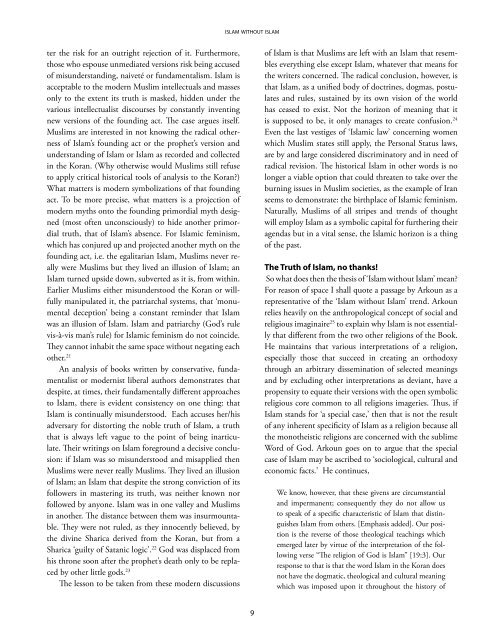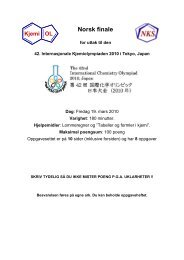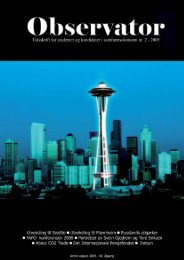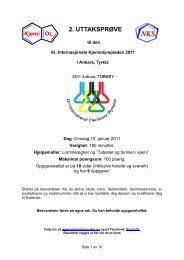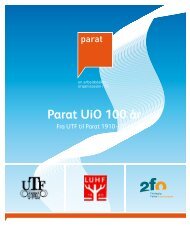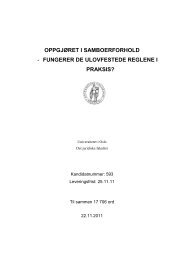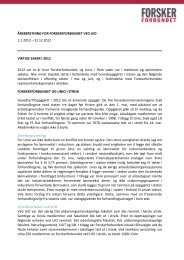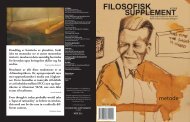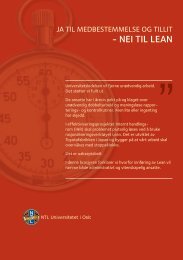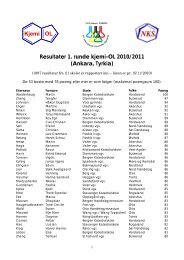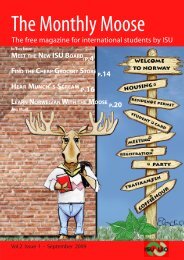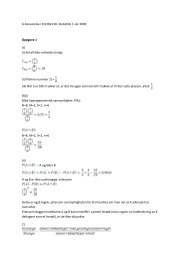filosofisk supplement - Universitetet i Oslo
filosofisk supplement - Universitetet i Oslo
filosofisk supplement - Universitetet i Oslo
- No tags were found...
Create successful ePaper yourself
Turn your PDF publications into a flip-book with our unique Google optimized e-Paper software.
i sl a m w i t h o u t i sl a mter the risk for an outright rejection of it. Furthermore,those who espouse unmediated versions risk being accusedof misunderstanding, naiveté or fundamentalism. Islam isacceptable to the modern Muslim intellectuals and massesonly to the extent its truth is masked, hidden under thevarious intellectualist discourses by constantly inventingnew versions of the founding act. The case argues itself.Muslims are interested in not knowing the radical othernessof Islam’s founding act or the prophet’s version andunderstanding of Islam or Islam as recorded and collectedin the Koran. (Why otherwise would Muslims still refuseto apply critical historical tools of analysis to the Koran?)What matters is modern symbolizations of that foundingact. To be more precise, what matters is a projection ofmodern myths onto the founding primordial myth designed(most often unconsciously) to hide another primordialtruth, that of Islam’s absence. For Islamic feminism,which has conjured up and projected another myth on thefounding act, i.e. the egalitarian Islam, Muslims never reallywere Muslims but they lived an illusion of Islam; anIslam turned upside down, subverted as it is, from within.Earlier Muslims either misunderstood the Koran or willfullymanipulated it, the patriarchal systems, that ‘monumentaldeception’ being a constant reminder that Islamwas an illusion of Islam. Islam and patriarchy (God’s rulevis-à-vis man’s rule) for Islamic feminism do not coincide.They cannot inhabit the same space without negating eachother. 21An analysis of books written by conservative, fundamentalistor modernist liberal authors demonstrates thatdespite, at times, their fundamentally different approachesto Islam, there is evident consistency on one thing: thatIslam is continually misunderstood. Each accuses her/hisadversary for distorting the noble truth of Islam, a truththat is always left vague to the point of being inarticulate.Their writings on Islam foreground a decisive conclusion:if Islam was so misunderstood and misapplied thenMuslims were never really Muslims. They lived an illusionof Islam; an Islam that despite the strong conviction of itsfollowers in mastering its truth, was neither known norfollowed by anyone. Islam was in one valley and Muslimsin another. The distance between them was insurmountable.They were not ruled, as they innocently believed, bythe divine Sharica derived from the Koran, but from aSharica ‘guilty of Satanic logic’. 22 God was displaced fromhis throne soon after the prophet’s death only to be replacedby other little gods. 23The lesson to be taken from these modern discussionsof Islam is that Muslims are left with an Islam that resembleseverything else except Islam, whatever that means forthe writers concerned. The radical conclusion, however, isthat Islam, as a unified body of doctrines, dogmas, postulatesand rules, sustained by its own vision of the worldhas ceased to exist. Not the horizon of meaning that itis supposed to be, it only manages to create confusion. 24Even the last vestiges of ‘Islamic law’ concerning womenwhich Muslim states still apply, the Personal Status laws,are by and large considered discriminatory and in need ofradical revision. The historical Islam in other words is nolonger a viable option that could threaten to take over theburning issues in Muslim societies, as the example of Iranseems to demonstrate: the birthplace of Islamic feminism.Naturally, Muslims of all stripes and trends of thoughtwill employ Islam as a symbolic capital for furthering theiragendas but in a vital sense, the Islamic horizon is a thingof the past.The Truth of Islam, no thanks!So what does then the thesis of ‘Islam without Islam’ mean?For reason of space I shall quote a passage by Arkoun as arepresentative of the ‘Islam without Islam’ trend. Arkounrelies heavily on the anthropological concept of social andreligious imaginaire 25 to explain why Islam is not essentiallythat different from the two other religions of the Book.He maintains that various interpretations of a religion,especially those that succeed in creating an orthodoxythrough an arbitrary dissemination of selected meaningsand by excluding other interpretations as deviant, have apropensity to equate their versions with the open symbolicreligious core common to all religions imageries. Thus, ifIslam stands for ‘a special case,’ then that is not the resultof any inherent specificity of Islam as a religion because allthe monotheistic religions are concerned with the sublimeWord of God. Arkoun goes on to argue that the specialcase of Islam may be ascribed to ‘sociological, cultural andeconomic facts.’ He continues,We know, however, that these givens are circumstantialand impermanent; consequently they do not allow usto speak of a specific characteristic of Islam that distinguishesIslam from others. [Emphasis added]. Our positionis the reverse of those theological teachings whichemerged later by virtue of the interpretation of the followingverse “The religion of God is Islam” [19:3]. Ourresponse to that is that the word Islam in the Koran doesnot have the dogmatic, theological and cultural meaningwhich was imposed upon it throughout the history of9


